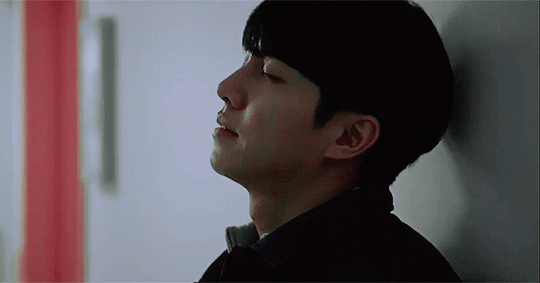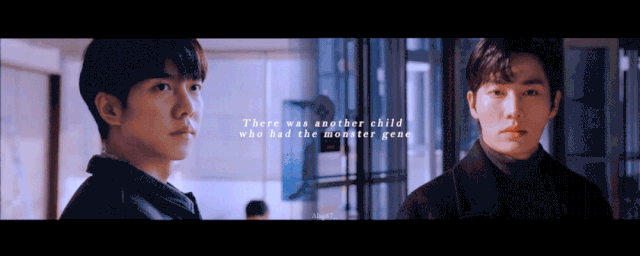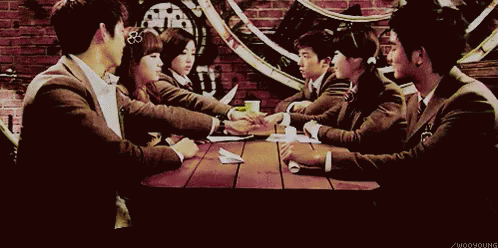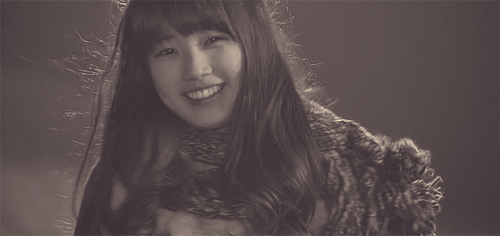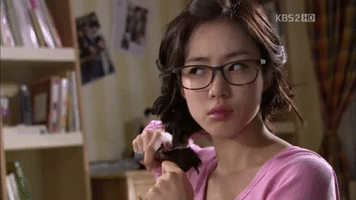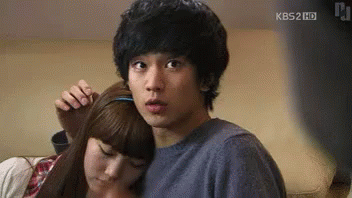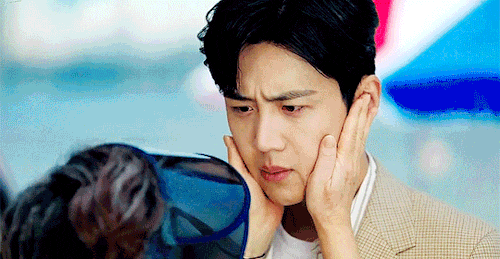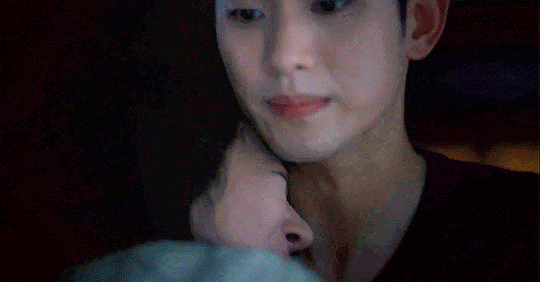9/10: Yes, I boarded the hype train. And YES, I finally boarded it on time, when internet memes and discussion abound! I don’t think I’ve been this early to anything since “Goblin: The Great and Lonely God”, lmao. This 9 episode series was about 8.5 hours of gore-y social commentary that truly psychologically tormented me lol. In the best way possible. I can say with reasonable confidence that Squid Game lives up to the hype!!
[HEAVY SPOILERS]
Disclaimer: I really don’t know how to talk about my thoughts about this drama without also going through some of the major plot points, so I know this is going to be super long and probably disorganized. My apologies!!
Squid Game follows the story of Seong Gi-hun, a man who has fallen on hard times and has become almost your quintessential “dead beat” – divorced, bad father that can’t do right by his daughter, financially ruined, in a ton of debt to creditors and loan sharks, and hedging his bets on horse races with whatever cash he has left. One day, he is approached by a mysterious man who asks him if he will play a game for money. I LOVED Gong Yoo’s cameo. His lovable and familiar face was now symbolic of the sinister turn that this show would take. Unable to refuse gambling some slaps in the face for a chance to win money, the pair play ddakji, a very popular children’s game, and after getting slapped around and then finally winning one round, Gi-hun is invited to participate in a 6-game competition for the chance to win a LOT more money. Of course, the audience can anticipate that the stakes will be much higher than simply getting slapped in the face. He accepts the invitation, and is basically “squid-napped” in the dead of night, waking up to find himself in a freaky death camp-looking place. All the players are wearing green numbered tracksuits, from 001 to Gi-hun, who is number 456. Essentially, their names and identities have been stripped, which is a huge red flag. He’s in a room full of people who like him, have nothing to lose, and are desperate to win. It is quite clear that no one knows what the fudge is going on, but they all follow the instructions given by guards who are wearing red body suits and fencing masks with a circle, triangle, or square, harkening back to “the squid game”, a childhood game that was introduced at the beginning of the show. And above them all, there is another mysterious masked man who wears all black, and is referred to as the “front man”. All the players sign a contract that has only three clauses: 1. no player is allowed to stop playing; 2. any player who refuses to play will be eliminated; and 3. the games can be terminated if the majority agrees to end it.
It is very quickly established by the first game, “red light, green light”, that when the rules say players “will be eliminated”, it means YOU GET SHOT. Every game is a dark twisted iteration of a popular kids’ game, making the whole thing even more disturbing. The “light-hearted” games are juxtaposed with all the death and terror experienced by the players. After the first game, more than half of the participants were killed, and the remaining players took a vote to end the games. Before the voting begins, the prize money amount is revealed, being a staggering 45.6 billion won total (around 39 million USD), with each player being worth 100 million won (around 84,000 USD)…these people are convinced that they are literally worth more dead than alive. The thought of winning such an amount actually convinces many players to want to keep playing. The final deciding vote is cast by player 001, an extremely old man who told Gi-hun that he was dying of a brain tumour. Gi-hun chooses to end the game, making that the majority rule, and everyone is thrust back into their old lives. Interestingly, this second episode was called “hell”. As brutal and horrifying the Squid Games were, the struggle of existence for those in financial need is basically a slower, more arduous hell on earth. One of the characters aptly stated that in the real world, he doesn’t stand a chance, but within the games, maybe he could even win. By the end of episode 2, everyone voluntarily chooses to return to the Squid Games, now knowing the stakes. They decide to hedge their bets, to win big, or die trying. This really highlights what I believe is the biggest tragedy of the show. Pride tells these people that they could win, and shame tells them that this is all they are worth. That the best they can do is to go down into a pit to fight and claw at each other and willingly give up their humanity to survive.
By this time, the audience gets to know a few of the other characters that Gi-hun starts to befriend. There is a North Korean defector named Kang Sae-byeok (no. 067), who is a clever but cold young woman who needs the prize money to regain custody of her younger brother and sponsor her mother out of North Korea. She is strong, resourceful, and definitely one of my favourite characters. Then there is Cho Sang-woo (no. 218), who was actually on of Gi-hun’s best childhood friends. He was successful early in life, graduating from Seoul National University with a business degree, but ended up committing a lot of financial crimes and losing everything. In the beginning he seemed to be a trustworthy and smart ally, but slowly we see how calculating and unscrupulous he can be. He isn’t entirely evil, but desperation and selfishness bring out the worst in him, and he is willing to do whatever it takes to win. It makes sense, because even before the Squid Games, he took advantage of people for personal gain through fraud and embezzlement. Then there is Ali Abdul (no.199), a very gentle and kind man from Pakistan who was cheated of his wages by a corrupt employer. Ali was such a cinnamon roll!! He was so innocent and trusting and selfless, and saved other players and teammates multiple times throughout the games. Finally there is Oh Il-nam (no. 001), the old man Gi-hun becomes familiar with early on. He seems to be slowly degenerating mentally, but his wisdom and experience, and seemingly lack of fear of death, are his greatest assets.
A very intriguing side-plot that is explored throughout the series follows a police detective named Hwang Jun-ho, who begins to suspect that his older brother may have been kidnapped into the squid games as well, after hearing Gi-hun’s frantic account trying to file a police report after being released. Jun-ho tails Gi-hun when he is taken by the masked red men again, and he manages to infiltrate into the facility by killing one of the workers and putting on the suit and mask. Jun-ho discovers that his brother had indeed been drafted into the squid games, and that he had actually won in 2015! But where was he now? It is also made known that turns out anonymous “VIPs” were the ones behind it all. These atrociously wealthy individuals were watching the squid games and betting on players!!! It is 100% a more elaborate and sadly, more realistic version of the hunger games. But in this case, the players are completely unaware that they are being treated like animals. Just as Gi-hun bet on race horses for fun and entertainment, these high class folks abused the poor and disadvantaged for their own amusement. Before Jun-ho could blow the lid off everything and have it shut down, however, he is discovered, and chased down by the front man, a differently masked person who seemed to be the head manager of the games. And it is there we find out…the front man is Jun-ho’s older brother!!! WTF. So many questions. Jun-ho unfortunately is shot by his brother, and falls off a cliff into the ocean below. The audience is left wondering whether he is dead or alive. He “died” off-screen, and the law of Korean dramas dictates that until a body is seen, ANYONE COULD STILL BE ALIVE. So I’m holding out hope that if there is a season 2, that he will return…he was honestly such a boss character. Busting into this effing crazy situation with no prior knowledge, and getting as far as he did. Amazing, I stan.
The second game is also another one any Korean would find familiar. It involves cutting a shape out of a flat piece of dalgona honeycomb – either a triangle, star, circle, or umbrella. No one knows what shape they’ll get (except one man, who turns out to be a doctor that is forced into a black market organ selling sub-plot LOL), so whoever gets stuck with the hardest shape, the umbrella, most likely will fail the game and be immediately executed. Sang-woo’s greed and instinct for self-preservation starts to harden his heart. Prior to the game, he had a hunch as to what the task would be based on Sae-byeok telling him she smelled the workers melting sugar. He also observed that the doctor character seemed to have insider information, since he rushes to the triangle right away, so he follows him and chooses the triangle shape as well. Sang-woo does not to share his knowledge with any other player, not even his friend. In fact, he goes so far as to tell everyone to split up, because then there’s less likelihood they will be facing the same problem, and therefore won’t be able to help each other. He essentially wants to get others eliminated to increase his own odds of winning. The guy is cold-blooded as hell I tell you. And just Gi-hun’s luck, he unfortunately chooses the umbrella, but manages to win the game with just seconds remaining, by licking the back of the dalgona to dissolve the sugar and make cutting out the shape easier. All the games involve a sickening amount of psychological manipulation, and the stress and anxiety of the time-sensitive situation made most of the players fixate on using a needle to cut out the shapes, because it was provided to them. However, there was no rule stated that they could ONLY use the needle. So Gi-hun using his saliva was actually a very clever tactic.
Not surprisingly at this point, a lot of characters have become the worst versions of themselves in the games. It was truly sad and horrifying to see some people so willing and almost delighted to kill and stomp on others in their desperation to escape death and win. After the second game, lunch is served, but the players are purposefully fed less food to create dissention and increase desperation. Some thugs realize that the more people they could get rid of, the higher their chances would be of winning during each game. This encourages a fight to break out during bedtime, which was actually what the game coordinators wanted all along, in order to weed out the weaker players. With no rules or control, the players fall into complete chaos, people killing each other left and right behind a strobe-lit background. Ultimately, the Squid Games did not create monsters, it only revealed what every human can choose to be capable of, if the conditions are right. When a person loses control, self-respect, and feels utterly cornered, he or she may embrace their darkest animalistic instincts to survive.
The third game was tug-o-war. The remaining 80 players are told to form teams of ten, and play deadly tug-of-war on very high platforms, with the losing team falling over the edge and plunging to their deaths. One of the main forms of torture of this show was that the players are not given any information about the games until they get into the playing room. They are told to pick teams, but based on what? They don’t know! Gi-hun and Sang-woo end up on a team with mostly outcasts; the old man player 001, as well as several women including Sae-byeok and another young girl named Ji-yeong. This puts them at a strong disadvantage for tug-o-war, but thankfully 001 seemed to have a lot of experience and knowledge of many of theses childhood games, and his strategies, along with the help of a cheap shot move by Sang-woo (he told the team to take three steps forward so that the other team loses their balance and falls), enables their team to win. Is anyone surprised that Sang-woo once again uses some under-handed means to win? But not gonna lie though, those strategies were all s-tier, and I will definitely use them too if I ever get caught up in a tug-o-war game to the death.
The fourth game was marbles. The remaining players were told to pick a partner to play with. However, unbeknownst to them, the partners will actually be competing against one another. They are instructed to play any marble game they want to gain marbles from each other, and whoever ends up with all of the other player’s marbles wins. of course, whoever loses all their marbles, loses their lives as well. This game was definitely the most heart-wrenching for me. The friendships and teams that had been established through the first three games, were now torn apart very cruelly as the players were forced to pick a winner and loser between them. Gi-hun and Il-nam spent a majority of the game time wandering the playground, which was set-up to look like an old hometown neighbourhood. Il-nam appeared to be losing more than just his physical marbles, the man seemed to be hallucinating about the days of his youth, much to Gi-hun’s frustration. Out of desperation, Gi-hun takes advantage of Il-nam’s confused state and cheats at the game to win all the marbles except one. Il-nam reveals that he was actually aware of Gi-hun’s cheating. Gi-hun is ashamed as Il-nam continues to call him “gganbu” (meaning ride or die friend), and gives him his final marble, allowing Gi-hun to win and move on to the next round. Sang-woo and Ali had chosen each other to be partners, but after Ali wins the marbles fair and square, Sang-woo convinces him that there was a way they could both win. Ali trusts him, but Sang-woo ends up stealing all the marbles and claiming victory. In his final moments, Ali realizes that he had been betrayed, and the look of utter defeat and sadness and disappointment was truly heart-breaking. To the very end, Ali was not angry or vindictive. HE WAS SUCH AN MVP I CAN’T EVEN. I definitely cried a bit when he died. Sae-byeok partnered up with another young woman named Ji-yeong, who had gone to prison for killing her abusive father. The two had slowly developed a mutual understanding throughout the games and had grown to trust and rely on each other. Faced with the reality of one of them having to die, Ji-yeong suggests they just talk for a while, and then play one decisive round when time is almost up. They share a very touching conversation about their pasts and future goals. When it’s time to play, Ji-yeong loses on purpose, wanting Sae-byeok to win. Enraged, Sae-byeok tries to convince Ji-yeong to stop messing around a play for real, but Ji-yeong simply states that she realized she didn’t know what she would even do with the money if she won, nothing came to mind at all. Ji-yeong makes Sae-byeok promise to live her life to the fullest, and thanks her for playing with her. Sae-byeok is completely wrecked and broken as she stumbles out of the play area, unable to look back as Ji-yeong gets shot behind her.
The fifth game is a horrifying game of hopscotch, taking place on a high platform that forces the players to jump onto panes of glass. Some are made of normal glass that cannot hold the weight of even one person, and some of made of tempered glass, that can hold the weight of two people. Before they know the game, the players choose the order in which they will play, and then one by one, they try to jump their way from one side of the platform to the other. Obviously the majority of the players fall to their deaths. The psychological torture of choosing a number, as well as the game itself, really made this episode one of the most painful for me. Players would push each other, or refuse to move until others agreed to move in front, etc. It was simply brutal to watch. The most shocking moment though, was when Sang-woo pushes one of the players in front him to get to the final safe pane. It is very apparent that Sang-woo has almost entirely lost his humanity, feeling justified to do whatever he needs to do in order to win. Only Gi-hun, Sang-woo, and Sae-byeok survive this round, but Sae-byeok is critically wounded by a ricocheting glass shard. She makes them promise each other that whoever survives must take care of the other person’s loved ones. This scene was so infuriating and tragic. My girl got sidelined by a piece of glass??? Sae-byeok was such a strong player and character, and it was great to see her development from a cold and closed off person, into someone who learned to trust others. She and Gi-hun truly bonded, and helped keep each other centred. Gi-hun actually considered killing Sang-woo after he realized how unhinged and bloodthirsty he had become, but Sae-byeok stopped him, reminding him that this kind of person was not who he was. When Gi-hun leaves her side for only a few seconds to call for medical help, she ends up being killed by Sang-woo, stabbed in the neck by a steak knife. The final deterioration of Sang-woo’s morality was highlighted by the horrible tragedy of Sae-byeok’s death, and shows the fundamental differences between Gi-hun and Sang-woo.
The sixth and final game was the infamous squid game. I’m still not entirely sure of all the rules, but it seemed like a combination of tag, four corners, and just tussling lol. Gi-hun and Sang-woo literally engage in a fight to the death, with Gi-hun finally coming out victorious. Once Gi-hun crosses the finish line, Sang-woo will be killed and he will get the prize money. However, at the last second, Gi-hun decides that there is way they can both survive: if the two of them both agree to terminate the games, then clause three would come into affect and they could be free. Ultimately, Gi-hun’s desire to maintain his humanity, and to save his friend’s life, was more important to him than the prize money, even though he was literally so close. Sang-woo realizes what a monster he had become, and after apologizing to Gi-hun, he stabs himself in the neck, rejecting Gi-hun’s pleas for them to both let go of this terrible dream. For Sang-woo, he already had his heart set on “go big or go home”, and the thought of living through this with “nothing” to show for it, was worse than death. Indeed, in episode two when they were all returned to their normal lives, Sang-woo actually was in the middle of committing suicide before he was given a second chance at the squid games.
Gi-hun is the winner of the Squid games, but he is literally scarred for life. He is dumped back into the city with a debit card that gives him access to his prize money, about 47 billion won. He returns home to discover that his mother passed away while he was gone, alone and probably sad and desperate for her son. Gi-hun was fighting to the death for money for his family, but he ended up losing the few people who were precious to him. One year later, we fine Gi-hun living exactly like he had before. He hasn’t touched the prize money at all. He is depressed, empty, and a shell of a person. Until he gets a card that looks suspiciously like the Squid game business card he was given in the beginning. On the back of the card is a time, date and address, and is signed, “your gganbu”. And then we are presented with the biggest plot twist of the series…THE OLD MAN, PLAYER 001, WAS THE MASTERMIND BEHIND THE SQUID GAMES ALL ALONG. Gi-hun, like the audience, is at a complete loss for words. No cap I was literally shrieking. In hindsight and upon re-watching, we can see that there were multiple clues that pointed to Il-nam being the head of this circus. One subtle clue was that during the “red light, green light” game, he was the only player who wasn’t scanned for movement, because he was never at risk of being shot. He also moved forward very confidently, with no fear at all. During the dalgona sugar candy cut-out game, he chose the star shape, which has short straight lines and is arguably easier to cut out than some of the other shapes. During the tug-of-war game, his strategies and wisdom was what enabled his team to beat the odds and win against tougher and stronger individuals. And finally, he was supposedly killed during the marble game against Gi-hun, but the audience never sees him get shot, nor do we see his body afterwards. Also, although it appeared that he was losing his mind and awareness during that game, which allowed Gi-hun to trick him into losing marbles, he voluntarily gave his last marble to Gi-hun, saying “you win”, showing that he was in control, and also foreshadowing that Gi-hun would actually go on to win the entire game. It also makes sense that Il-nam would dip out before the glass pane hopscotch game, because that game is a lot less predictable, with people pushing each other, or getting frantic and potentially endangering him. Throughout the games, it was clear that Il-nam was super familiar with all these nostalgic childhood games, and after it is revealed that it was actually his playground, it totally makes sense that he would model the squid games after his own experiences and good memories. His player number, 001, also hints at the fact that he’s “number 1”, in control and just there for the shits and giggles. In episode 2, when Il-nam casts the deciding vote that allows everyone to go home, even that it is done intentionally. It’s not fun to play with reluctant people. He wanted everyone to voluntarily decide to return and play with him. It’s actually sick, lol. Anyways, despite all these clues, I WAS STILL NOT PREPARED FOR THIS REVEAL.
Utterly flabbergasted, Gi-hun demands an explanation. Oh Il-nam wasn’t lying when he told Gi-hun that he had a brain tumour, because the man is clearly on his death bed during this meeting. With his dying breaths, Il-nam explains that one thing that poor people and rich people have in common, is that life is boring. And so, after he had become unbelievably wealthy, he and his small group of elites (the VIPs) created the squid games as way to entertain themselves. He also reveals that the reason he decided to participate himself this time, was simply because it would be more fun, that playing the games would allow him to “feel something again”, more so than merely spectating. Il-nam’s philosophy is that all humans are completely evil and depraved, and so there is nothing wrong with treating them like animals and using their suffering for his own enjoyment. This final encounter with Il-nam is what finally shakes Gi-hun into action. He realizes that he can actually help people and change their lives with his wealth, rather than doing nothing, or entering back into the cycle of depravity. He rescues Sae-byeok’s younger brother from the orphanage, and puts him under the care of Sang-woo’s mother. He also gifts them with a suitcase of straight cash, leaving a note saying it is the money he owed Sang-woo.
One significant thing Gi-hun chooses to do is to dye his hair a bright red. Throughout the show, the green tracksuits of players signifies submission, being enslaved, being a cog in the wheel of this immoral machine called life. Red, on the other hand, was what all the workers and guards were wearing, and signifies authority and power. Gi-hun’s decision to dye his hair red could be a way to show that he is now in the power seat, and that he wants to call the shots from now on. But unlike the red suited masked men in the squid games, Gi-hun chooses not to abandon the weak, but instead he will fight for them. This is made very clear when he encounters the mysterious “train man” from episode one (aka Gong Yoo WOOOOO) playing ddakji with a random guy in the subway again, when he was on his way to the airport to visit his daughter in America. The two men make eye contact, and Gong Yoo slowly smiles in a very innocent but sinister way. Gi-hun is unable to catch him, but does manage to take the squid game business card away from the poor unsuspecting fool that Gong Yoo was bullying, lol. Gi-hun calls the number on the back of the card, and is greeted once again with a voice asking him if he would like to participate in a game. Gi-hun demands to know who the person on the other side is, and that the games be stopped. It is the front man who responds, telling him to just get on the plane, that this would be better for everyone. In the final scene, Gi-hun hangs up, and turns away from boarding the plane, and with a look of determination and resolve, begins to walk back.
WHAT A WILD RIDE. This is the first drama review where I really felt like I had to give a full summary of the story so that my thoughts and commentaries could be digested with more context. I’ve seen so many theories circulating about Squid Game, and it’s just been so fun reading all of them and having my mind blown again. This is definitely not a drama for the faint of heart of weak of stomach, but it was such a deep and rewarding journey. It made me reflect on the human condition, and how desperately flawed we all are. I would highly recommend it to anyone who enjoys a more thriller/horror genre of Korean drama! Thanks for reading, and happy watching!!
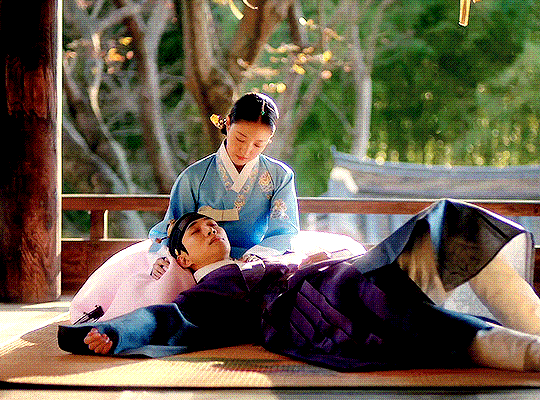









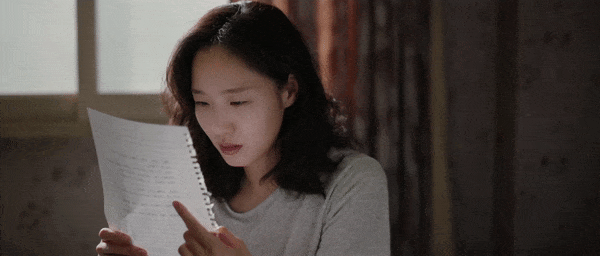




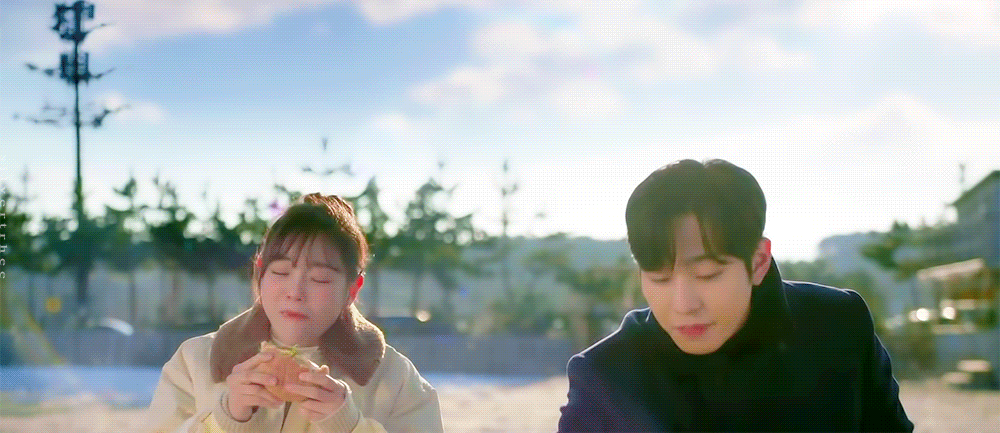
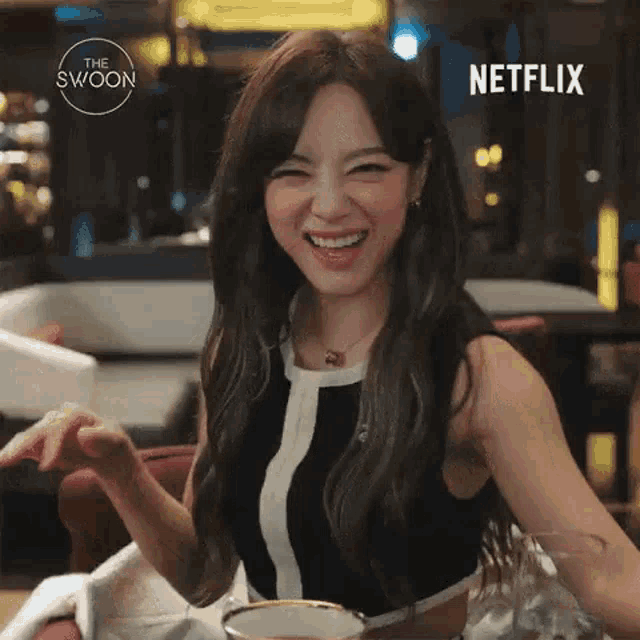
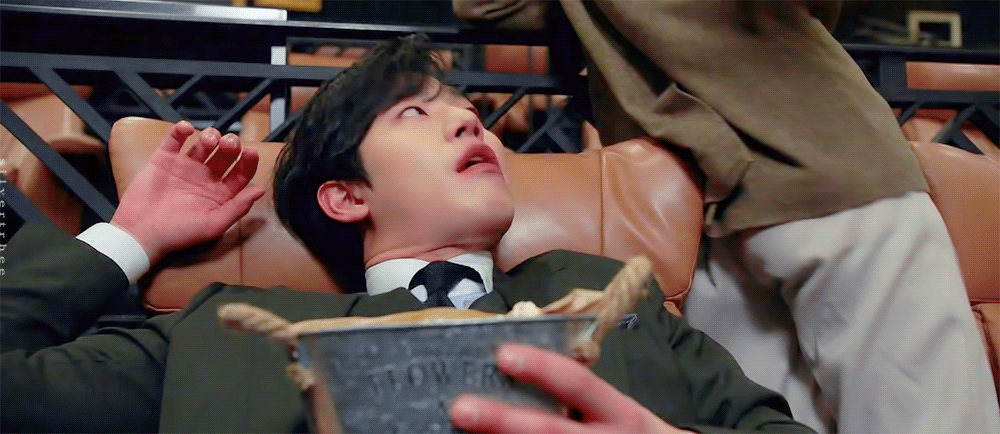



![GIF] The Goodbye Hug | My Ahjussi / My Mister Fan Site](https://givemeslippers.files.wordpress.com/2018/06/fighting.gif)


